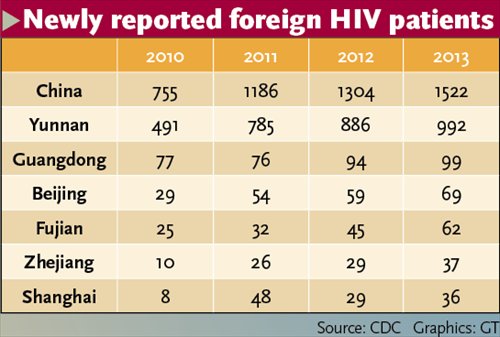Beijing ponders establishing a better system to treat foreigners with HIV
China is exploring a better way to treat foreign nationals living with HIV as the country reported increasing cases of HIV-infected residents. Yunnan Province which reported many HIV cases in families of cross-border marriage has already provided free testing and antiretroviral services to the immigrants. In addition, specialists voiced concerns over the Chinese purchase of brides from Myanmar and Vietnam as the high infection rate was detected in the group of people.

A physician tests donated blood in the Taiyuan Blood Center in Shanxi Province. Photo: CFP
According to statistics the Global Times obtained from the Chinese Center for Disease Control and Prevention (CDC), 12,764 foreign nationals living with HIV were residing in the Chinese mainland at the end of November, 1,638 of which were first reported this year, a growth of 14.7 percent over last year.
The number was mainly obtained from mandatory health tests on applicants for transnational marriage certificates or working visas, and the actual number could be larger, said Wu Zunyou, director of the National Center for AIDS and STD Control and Prevention at the CDC.
The number of foreign nationals tested with HIV has grown quickly since the ban on HIV-positive persons entering the country was lifted in 2010.
But the question of how to manage the medical treatment and follow-up monitoring of this group of people has become a concern for health officials and experts from both China and international organizations.
The UNAIDS China office is considering cooperating with Beijing Ditan Hospital, an affiliate of Capital Medical University designated for the treatment of AIDS, to create easy access to treatment for foreign AIDS patients.
Workers from the UNAIDS China office said the project hasn't yet been launched. Lun Wenhui, director of the Dermatology and STD Department at Beijing Ditan Hospital, said the collaboration is still in its initial stage.
"We are still negotiating. The hospital itself already has a mature system for treating foreign patients with HIV," Lun told the Global Times.
He noted that they have the green light to receive foreign patients who have medical insurance from their employers or from their own countries and to provide them with the certificates necessary to help them return to their country of origin.
But for those foreign patients who have no legal identity or who have financial difficulties, the problems are complex. "We can provide a certain amount of humanitarian aid to some individual patients, but we can't afford to do that for more people unless international organizations and embassies offer a hand."

Newly reported foreign HIV patients
Brides from Myanmar and Vietnam
Nearly half of the foreigners with HIV were diagnosed in the past five years. One in eight of them are AIDS patients, according to the report provided by the Center for AIDS and STDs. "It doesn't rule out that some of them might have died or left China," the center's director Wu Zunyou said.
Southwest China's Yunnan Province, which borders Myanmar, Vietnam and Laos, all of which have a high HIV prevalence, accounts for more than 70 percent of HIV cases in China.
In the border areas of Yunnan and Guangxi Zhuang Autonomous Region, there has long been a tradition of marrying women from neighboring countries.
In Yunnan, there are thousands of transnational families in Dehong Dai and Jingpo Autonomous Prefecture. "Many couples and their children there were found to have HIV," Wu said.
According to statistics provided by the Yunnan CDC, more than 90 percent of HIV-infected foreigners in the province are Myanmar nationals. Of the 745 cases reported in the first 10 months of this year, 75.4 percent were transmitted through sex and 22.7 percent were transmitted through drug use.
"Because Nanning, the capital of Guangxi, has become the permanent host of the annual China-ASEAN Expo, the communication and population flow between Southwest China and Southeast Asian countries have increased greatly," Wu explained.
The stream of people has boosted the entertainment sector on which the sex trade and drug use depend, increasing the risks of cross-border AIDS transmission, according the Guangxi CDC.
Another concern for Chinese AIDS control specialists is the booming business of "buying brides" from Myanmar and Vietnam fueled by demand for wives from rural Chinese men.
Last year, the Xiamen Exit-Entry Inspection and Quarantine Bureau reported seven foreigners with HIV, six of whom were Vietnamese brides, Xiamen Daily reported. Fujian's Zhangzhou reported that among the more than 900 brides who arrived there from Vietnam last year, four were found to have STDs and four others were found to have HIV.
Many of the brides are smuggled in, and the transmission risks are high if they have no idea about their condition or take no preventative measures. Some tragedies have resulted.
In May, the mother of a 3-year-old son set fire to her home in Wu'an township, Gaoyou in East China's Jiangsu Province. Luckily, the fire was discovered in time, and no one was injured. Weeks earlier, the woman's husband, Zhang, found that he was HIV positive when he went to donate blood. Zhang later took his wife and son to get tested and found that they were also infected with HIV, Nanjing-based Modern Express reported.
The woman, who is Vietnamese, was accused of infecting Zhang and their son. Zhang's family wanted her to leave, and her possible mental breakdown led to the arson, the Global Times learned from the Modern Express reporter.
Local health authorities provided free antiretroviral (ARV) therapy to the father and son, but the mother, who is an illegal immigrant, faced deportation by police.
Wu commented that her deportation was due to her illegal immigration status rather than to her AIDS diagnosis. Before 2010, foreigners found to have HIV would be deported, but now they can stay in China as long as they have a valid visa.
Yunnan's precedent
"China doesn't have a policy offering free HIV treatment to foreign nationals. Worldwide, the countries offering that service are few," Wu noted. The UK announced in 2012 that it will provide free HIV treatment for foreign nationals, including students and tourists.
"It's not only a financial problem but also a policy problem that will likely be controversial and draw opposition from the public, since the funding for AIDS response is limited and comes entirely from taxpayers," Wu noted.
China began implementing the "Four Free and One Care" policy to help all Chinese HIV/AIDS sufferers in 2003. The program provides free ARV drugs, free prevention of mother-to-child transmission, free voluntary counseling and testing, free education for children orphaned by AIDS and care to people living with HIV.
"There's a worry that more HIV-infected persons from neighboring countries will come to China if we include foreigners in this program," Wu added.
Tang Yabin, director of the Shenzhen Hongci Service Center for Women's Care, the largest NGO in the city working with HIV prevention and control for female sex workers, said funding is a major issue. "We know there are a few foreign sex workers here. Some brothels even have exclusively foreign workers. But our testing and counseling services are only open to Chinese, and they are only available to foreigners in case-by-case exceptions," Tang told the Global Times. "The funding for services for natives is not even sufficient."
Lun Wenhui of Beijing Ditan Hospital agreed, saying that China is itself a high-burden country with an estimated 800,000 HIV/AIDS sufferers.
In summer 2012, the hospital's emergency department received a female expatriate patient accompanied by several security guards. She was found to have HIV and tuberculosis, and she was three weeks pregnant.
She had no identity certificates and no relatives in China, and authorities only knew that she was from Uganda. Her friends abandoned her after finding out about her condition.
She was bedridden for 97 days, during which she was well treated, before she was finally sent back to Uganda through the joint efforts of the hospital, public security authorities, the Ugandan embassy and international organizations.
"We covered part of the treatment and nursing fees, but we didn't pay her flight fees," Lun said, noting that the hospital is not a charity.
Yunnan has set a precedent by expanding the "Four Free and One Care" policy to all foreign spouses. The authorities provide services, such as methadone maintenance treatment for drug users and free prevention of mother-to-child transmission to pregnant women, to other foreign HIV carriers depending on the duration of their stay in China, according to a reply the Yunnan CDC sent to the Global Times.
In addition, it has carried out cooperation projects on joint response to cross-border HIV infection with countries including Australia, the UK and neighboring countries. Meanwhile, it has built regular contact with service providers in neighboring countries to facilitate the treatment and transfer of HIV/AIDS sufferers.
Global issue
Following South Korea and the US, which announced they would no longer forbid HIV-infected foreigners from entering in early 2010, China revoked its ban in April 2010, becoming the 110th UN-member country to do so. But nearly all countries have health requirements for immigrants.
Australia has some of the strictest health standards in the world. Visa applicants are tested for infectious diseases including tuberculosis, HIV and hepatitis, and those who test positive will be considered a threat to public health and may be rejected.
A staff member at visawhy.com, a private service center helping foreigners with Chinese visa procedures in Beijing, said expatriates will not be given work visas if they test positive for HIV.
Health examination at an approved hospital is the first step in applying for a working visa in China. "The test report will first be given to the exit-entry administration and the employer. According to common practice, applicants who test positive for HIV will have their work visa application rejected," the man told the Global Times.
In 2007, rumors spread in South Korea that foreign English teachers were molesting students and spreading HIV/AIDS. That year, the country began requiring all foreign teachers, including those who were already in the country, to get tested for HIV. Those who tested positive could have their contracts canceled and faced deportation.
Byong Hee Cho, dean of the Graduate School of Public Health at Seoul National University, told the Global Times that many health policymakers and specialists think the regulation is outdated and inappropriate, but the government has failed to persuade students' parents.
According to Cho, HIV tests and HIV medications are virtually free to Koreans and foreigners with national health insurance, but not to illegal immigrants. "Some NGOs and religious groups provide free services to illegal residents," he said.
Catherine Healy, national coordinator of New Zealand's Prostitutes' Collective, said that HIV treatment is not free for foreign sex workers in the country. In New Zealand, sex work is decriminalized, and there are around 4,000 sex workers in the country, including 150 from China.
She suggests that China stop allowing use of condoms to serve as evidence for arresting sex workers. "There is strong evidence that the decriminalization of sex work helps prevent the transmission of HIV," she told the Global Times.
Tang Yabin of the Shenzhen NGO said it would be ideal if AIDS treatment were free regardless of a patient's nationality. "If some international organizations offer us funding, we'll be glad to provide services to foreign nationals," Tang said.
Wu said China is doing preliminary studies of how to better manage this group of people.
"Pharmaceutical giants in developed countries have monopolized the research and development of advanced ARV drugs, which are so expensive that we can't afford them," he noted.